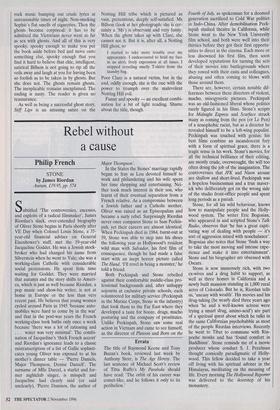Rebel without a cause
Philip French
STONE by James Riordan Aurum, £19.95, pp. 574 Subtitled 'The controversies, excesses, and exploits of a radical filmmaker', James Riordan's slack, over-extended biography of Oliver Stone begins in Paris shortly after VE Day when Colonel Louis Stone, a 35- year-old financial adviser on General Eisenhower's staff, met the 19-year-old Jacqueline Goddet. He was a Jewish stock- broker who had changed his name from Silverstein when he went to Yale; she was a working-class Catholic with considerable social pretensions. He spent little time waiting for Goddet. They were married that autumn and the story shifts to Ameri- ca, which is just as well because Riordan, a pop music and show-biz writer, is not at home in Europe or the less than very recent past. He believes that young women cycled around Paris in 1945 'because auto- mobiles were hard to come by in the war' and that in the post-war years the French working-class took baths only once a week because 'there was a lot of rationing and . . . water was very minimal'. The combi- nation of Jacqueline's 'thick French accent' and Riordan's ignorance leads to a classic mistranscription of a list of Gallic sophisti- cates young Oliver was exposed to at his mother's dinner table — 'Pierre Daniels, Major Thompson, Denise Darcell'. The surname of Mlle Darcel, a starlet and for- mer nightclub singer, is misspelt and Jacqueline had clearly said (or said unclearly), 'Pierre Daninos, the author of Major Thompson'.
In the States the Stones' marriage rapidly began to fray as Lou devoted himself to work and philandering and his wife spent her time shopping and entertaining. Nei- ther took much interest in their son, who learnt of their eventual separation from a French relative. As a compromise between a Jewish father and a Catholic mother, Oliver was raised as an Episcopalian and became a surly rebel. Surprisingly Riordan never once compares Stone to Sam Peckin- pah, yet their careers are almost identical. When Peckinpah died in 1984, burnt-out at 59, Stone was able to step into his shoes the following year as Hollywood's resident wild man with Salvador, his first film of consequence, though he had made a false start with an inept horror picture called The Hand. 'I'll revel in being a monster,' he told a friend.
Both Peckinpah and Stone rebelled against their comfortable middle-class pro- fessional backgrounds and, after unhappy sojourns at exclusive private schools, each volunteered for military service (Peckinpah in the Marine Corps, Stone in the infantry) that took them to the Far East where they developed a taste for booze, drugs, macho posturing and the company of prostitutes. Unlike Peckinpah, Stone saw some real action in Vietnam and came to see himself, as the director of Platoon and Born on the Fourth of July, as spokesman for a doomed generation sacrificed to Cold War politics in Indo-China. After demobilisation Peck- inpah studied theatre in California, while Stone went to the New York University film school, and both were well into their thirties before they got their first opportu- nities to direct in the cinema. Each more or less disowned his first film, then soon developed reputations for turning the sets of their movies into battlegrounds where they rowed with their casts and colleagues, abusing and often coming to blows with those around them.
There are, however, certain notable dif- ferences between these directors of violent, macho, misogynistic pictures. Peckinpah was an old-fashioned liberal whose politics rarely figured in his films. Stone's scripts for Midnight Express and Scarface struck many as coming from the pen (or Le Pen) of a xenophobic racist, but as a director he revealed himself to be a left-wing populist. Peckinpah was touched with genius: his best films combine an incandescent fury with a form of spiritual grace, there is a tragic sense in his work. Stone's movies, for all the technical brilliance of their editing, are mostly crude, overwrought, the will too often doing the job of the imagination. The controversies that JFK and Nixon arouse are shallow and short-lived. Peckinpah was a hopeless businessman and a true maver- ick who deliberately got on the wrong side of the studio front-office people and spent long periods as a pariah.
Stone, for all his wild behaviour, knows how to manipulate people and the Holly- wood system. The writer Eric Bogosian, who appeared in and scripted Stone's Talk Radio, observes that 'he has a great capti- vating way of dealing with people — it's sort of aggression mixed with nonchalance'. Bogosian also notes that Stone 'finds a way to take the most moving and intense expe- rience and make it into entertainment'. Stone and his biographer are obsessed with Oscars.
Stone is now immensely rich, with two ex-wives and a drug habit to support, as well as three homes in California and a newly built mansion standing in 1,000 rural acres of Colorado. But he is, Riordan tells us, 'uneasy with wealth'. His movies and his drug-taking (he nearly died three years ago when 'he and a well-known actress were trying a smart drug, amino-acid') are part of a spiritual quest about which he talks in the same Californian psychobabble as most of the people Riordan interviews. Recently he went to Tibet to commune with Rin- poche monks and has 'found comfort in Buddhism'. Stone reminds me of a movie producer whose conduct S. 5. Perelman thought comically paradigmatic of Holly- wood. This fellow decided to take a year off living with his spiritual adviser in the Himalayas, meditating on the meaning of life. Every morning The Hollywood Reporter was delivered to the doorstep of his monastery.


















































































 Previous page
Previous page